
Exposé Online
What's old
Exposé print issues (1993-2011)
- 1 (October 1993)
- 2 (February 1994)
- 3 (May 1994)
- 4 (August 1994)
- 5 (October 1994)
- 6 (March 1995)
- 7 (July 1995)
- 8 (November 1995)
- 9 (March 1996)
- 10 (August 1996)
- 11 (February 1997)
- 12 (May 1997)
- 13 (October 1997)
- 14 (February 1998)
- 15 (July 1998)
- 16 (January 1999)
- 17 (April 1999)
- 18 (November 1999)
- 19 (May 2000)
- 20 (October 2000)
- 21 (March 2001)
- 22 (July 2001)
- 23 (December 2001)
- 24 (April 2002)
- 25 (September 2002)
- 26 (February 2003)
- 27 (August 2003)
- 28 (December 2003)
- 29 (April 2004)
- 30 (September 2004)
- 31 (March 2005)
- 32 (September 2005)
- 33 (May 2006)
- 34 (March 2007)
- 35 (January 2008)
- 36 (October 2008)
- 37 (July 2009)
- 38 (July 2010)
- 39 (Summer 2011)
Features
The World Returns to Seattle —
WOMAD USA 2001
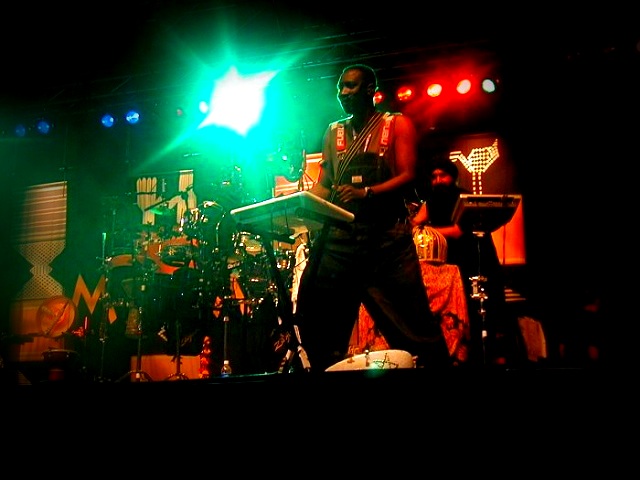
The main thing about the WOMAD (World Of Music, Art, and Dance) festival is: it's big. Really big. There are four major stages and several areas for workshops and other activities spread over two and a half days. Twenty or so food vendors. Dozens of merchandise tents. Way too much going on to catch it all. 2001 was the fourth year for WOMAD at Marymoor Park, and the first one not run by local event producers One Reel. Whatever really went on behind the scenes, the end result was One Reel and WOMAD parted ways, and an outfit called The Workshop took on the daunting task of organizing the whole thing on a shortened schedule – once it was determined that there actually would be a festival. To be honest, there were some glitches, but nothing major, and it's hard to imagine anyone could have done much better. The big draw this year was to be the presence of one of WOMAD's founders, Peter Gabriel, and after some shuffling (at one time, Robert Plant was scheduled, then replaced by Gregg Allman), a lineup of more than forty artists representing more than twenty nations came together.
by Jon Davis, Published 2001-12-01
photography by Danette Davis
The big draw this year was to be the presence of one of WOMAD's founders, Peter Gabriel, and after some shuffling (at one time, Robert Plant was scheduled, then replaced by Gregg Allman), a lineup of more than forty artists representing more than twenty nations came together.
Friday
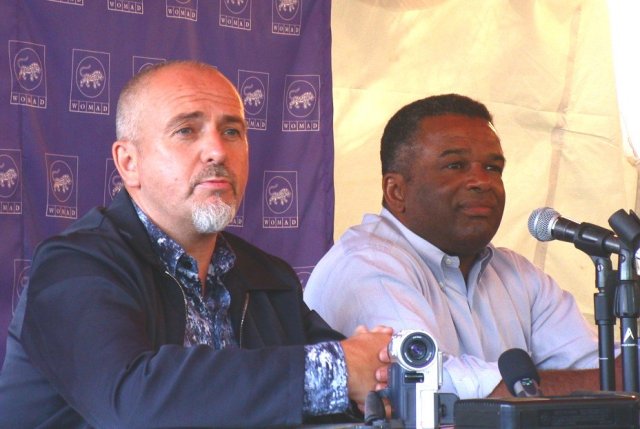 Friday afternoon started off with a schedule change. The opening ceremony with Peter Gabriel and King County Executive Ron Sims (who was instrumental in bringing the event to the area) was delayed, as was their press conference. Press of all media and clout levels (from CNN to Exposé) crowded around a little tent to ask a few questions. Those who have followed Peter Gabriel's career likely already know the answer to one of the questions asked: When can we expect your next album?
Friday afternoon started off with a schedule change. The opening ceremony with Peter Gabriel and King County Executive Ron Sims (who was instrumental in bringing the event to the area) was delayed, as was their press conference. Press of all media and clout levels (from CNN to Exposé) crowded around a little tent to ask a few questions. Those who have followed Peter Gabriel's career likely already know the answer to one of the questions asked: When can we expect your next album?
"I'm easily distracted – by things like this," he said, gesturing around the grounds. But, he added, the long-awaited Up should be done by the end of 2001, and out sometime in 2002.
After only a few more questions, the crowd dispersed for a modified opening ceremony on the main stage. After a quick introduction by Executive Sims, Peter Gabriel expressed his hopes that the weather would hold good. "Certainly the music is going to," he said, then handed the stage over to David Lindley and Wally Ingram.
Shortly after Lindley and Ingram started their set, Greek singer Savina Yannatou and her group Primavera en Salonico took to one stage, while multinational group Baka Beyond took to another. Yannatou has an amazing voice, able to go from a sweet breathy tone to piercing wavering in an instant. In addition to Greek traditional music, she has a background in free jazz, and applies improvisational arrangements to songs from around the Mediterranean. He acoustic band of upright bass, guitar, oud, zither, and percussion produced all manner of unusual sounds from their instruments. She introduced the songs as being from Sardinia or Greece or wherever, and started them in rather traditional manners, but somewhere the instruments would wander into atonal territory, and Yannatou made eerie, unnerving noises with her voice.
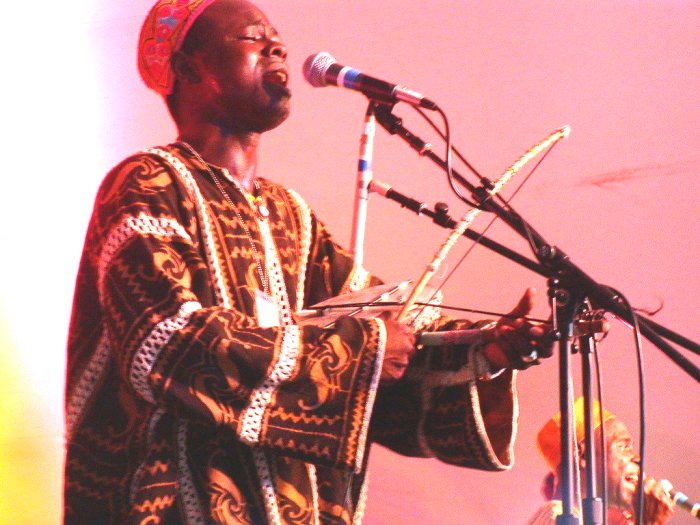 Baka Beyond presented their bouncy combination of Western pop and African beats, but didn't hold my interest, so I wandered over to another stage to catch Ifang Bondi, the venerable West African band credited with starting much of what has happened musically in that part of the world in the last twenty years. But far from appearing old or tired, the seven member band was full of energy and big smiles. Their fusing of African traditional style with modern instruments and funky rock provided an obvious blueprint for many successors, including Youssou N'Dour and the popular style called mbalax. One of the band's most intriguing features was a single-stringed instrument called the riti (pictured at left), played with a bow. Its wailing, soulful sound reminded me a little of a grittier version of Indian violin playing, like Shankar's instrument with a frog in its throat.
Baka Beyond presented their bouncy combination of Western pop and African beats, but didn't hold my interest, so I wandered over to another stage to catch Ifang Bondi, the venerable West African band credited with starting much of what has happened musically in that part of the world in the last twenty years. But far from appearing old or tired, the seven member band was full of energy and big smiles. Their fusing of African traditional style with modern instruments and funky rock provided an obvious blueprint for many successors, including Youssou N'Dour and the popular style called mbalax. One of the band's most intriguing features was a single-stringed instrument called the riti (pictured at left), played with a bow. Its wailing, soulful sound reminded me a little of a grittier version of Indian violin playing, like Shankar's instrument with a frog in its throat.
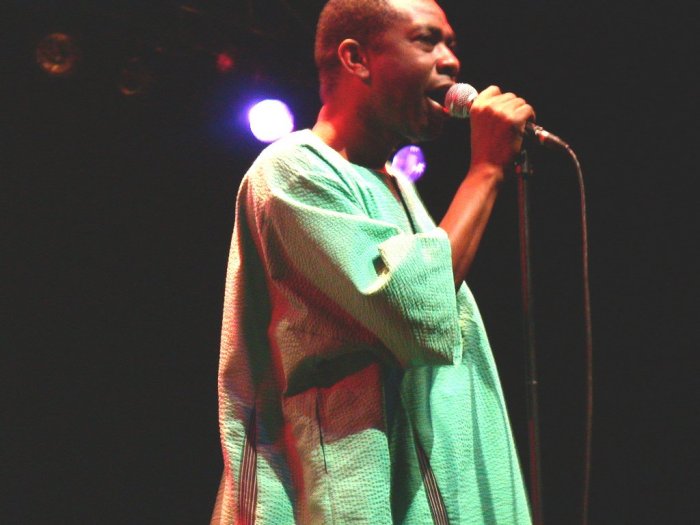 At 9:30 Friday night was one of the big decisions of the weekend: Senegalese superstar Youssou N'Dour on the big stage, or Trans-Global Underground on one of the smaller ones. A compromise decision resulted in catching the first three songs of N'Dour's set, rushing over to see a bit of TGU, then heading back to the main stage for the end of the night's show. Besides, the main stage was closer to the parking. Youssou N'Dour has slowed his released output in the last few years, but he showed he still has the talent and charm to captivate a large audience. He included songs from much of his career, from 1989's The Lion up to the present.
At 9:30 Friday night was one of the big decisions of the weekend: Senegalese superstar Youssou N'Dour on the big stage, or Trans-Global Underground on one of the smaller ones. A compromise decision resulted in catching the first three songs of N'Dour's set, rushing over to see a bit of TGU, then heading back to the main stage for the end of the night's show. Besides, the main stage was closer to the parking. Youssou N'Dour has slowed his released output in the last few years, but he showed he still has the talent and charm to captivate a large audience. He included songs from much of his career, from 1989's The Lion up to the present.
Trans-Global Underground have a unique style, respecting no borders or genres. Beats ranging from techno to hip hop underlie social and political raps, soulful female vocals, sitar, and Indian percussion. A large crowd overflowed the small stage, dancing wildly to the pounding rhythms.
Saturday
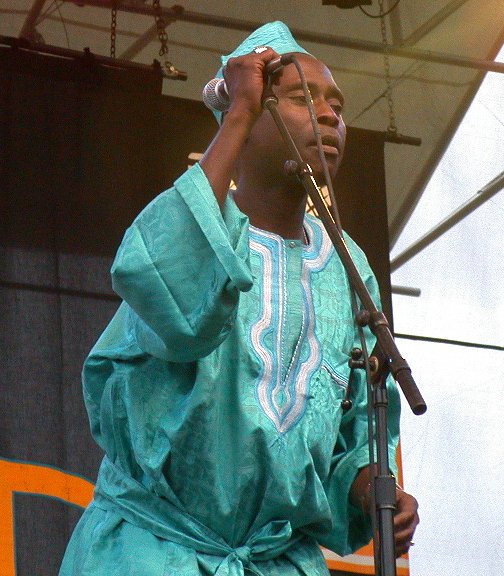 The festival's second day started with foreboding clouds and the promise of rain. A second performance from Ifang Bondi got the day off to an energetic start, however, this time on the main stage. The larger stage provided much better sound, and the band's members had more room to display their dance moves, much to the audience's delight.
The festival's second day started with foreboding clouds and the promise of rain. A second performance from Ifang Bondi got the day off to an energetic start, however, this time on the main stage. The larger stage provided much better sound, and the band's members had more room to display their dance moves, much to the audience's delight.
The next act on my must-see list was Lágbájá, a band from the Yoruba culture of Nigeria. The path to that stage passed by a performance of Cuba's Puentes Brothers, a large band pumping out high-octane Latin sounds, but I could see a crowd gathering at the other stage and decided to get a good spot. The lead singer of Lágbájá, also called Lágbájá, always wears a mask on stage, and I saw him several times off stage with his face still covered. As he explained during the set, he wants to symbolize the plight of the common man in Africa, who has no face and no voice. He pointed out that as he has traveled around the world, he has found that every country has a class of people who seem to be left out of the decision-making process.
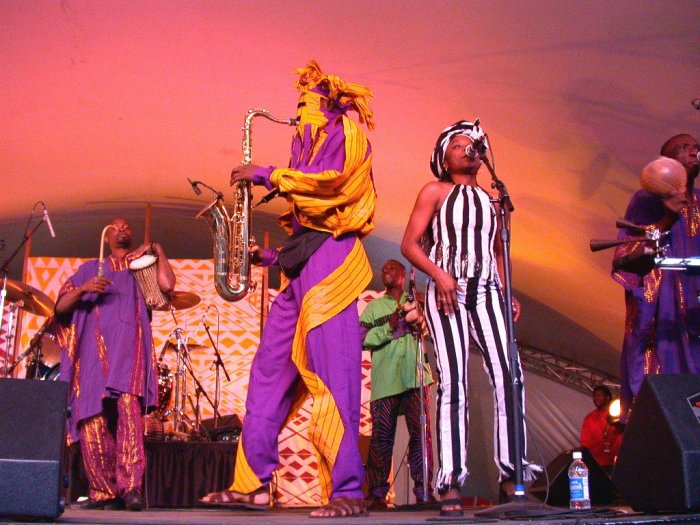 I had heard a bit of Lágbájá's new album, We Before Me, and found it interesting if not compelling. On CD, the arrangements came off a little sterile, veering perilously close to smooth jazz, but I had hopes that the live band would show more fire. I needn't have worried. The hour-long set consisted of only about five songs, each propelled by multiple percussionists along with the drummer and funky bass player. Lágbájá played hummable melodies on his tenor sax, often accompanied by wordless vocals from his female singer and the rest of the band. The lyrics were sometimes in English, but more often in Yoruban. Lágbájá provided articulate descriptions of each song's meaning, some of them focusing on social and political issues, others just for having a good time.
I had heard a bit of Lágbájá's new album, We Before Me, and found it interesting if not compelling. On CD, the arrangements came off a little sterile, veering perilously close to smooth jazz, but I had hopes that the live band would show more fire. I needn't have worried. The hour-long set consisted of only about five songs, each propelled by multiple percussionists along with the drummer and funky bass player. Lágbájá played hummable melodies on his tenor sax, often accompanied by wordless vocals from his female singer and the rest of the band. The lyrics were sometimes in English, but more often in Yoruban. Lágbájá provided articulate descriptions of each song's meaning, some of them focusing on social and political issues, others just for having a good time.
More than a little out of breath from that high-energy performance, it was time for a meal from one of the many food booths available. Just about any cuisine from around the world was represented, and everything smelled good, so it was hard to choose. My notes don't specify what I ended up with, but I took it off to the main stage, where Steel Pulse was entertaining a fair-sized crowd with their particular flavor of reggae, heavy on the lead guitar.
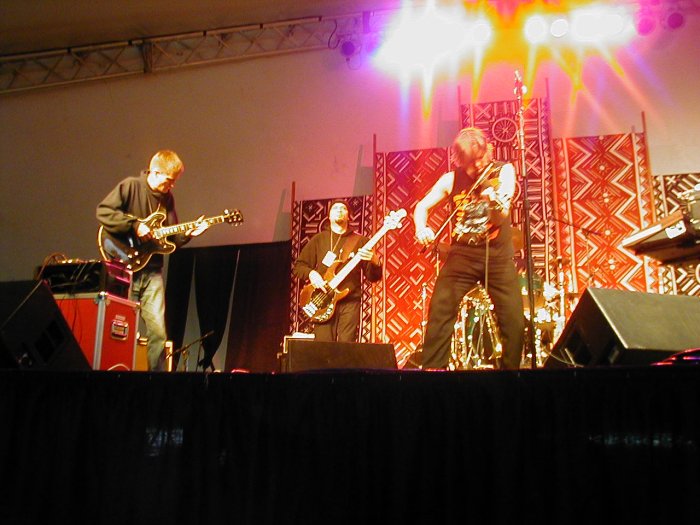 On a little stage behind the main stage, I found one of the big surprises of the festival, a somewhat local outfit called Lappelectro. Daniel Lapp and his crew hail from Victoria, British Columbia, on Vancouver Island, and the MC said this was their first performance off the island. Apparently word had filtered out, however, because a small but dedicated crowd squeezed into the shelter of the awning over the stage and waited for the show to start. Lapp is a multi-instrumentalist extraordinaire, having gained his Canadian fame as a violinist, but he's equally fluent on saxophone, flute, and trumpet.
On a little stage behind the main stage, I found one of the big surprises of the festival, a somewhat local outfit called Lappelectro. Daniel Lapp and his crew hail from Victoria, British Columbia, on Vancouver Island, and the MC said this was their first performance off the island. Apparently word had filtered out, however, because a small but dedicated crowd squeezed into the shelter of the awning over the stage and waited for the show to start. Lapp is a multi-instrumentalist extraordinaire, having gained his Canadian fame as a violinist, but he's equally fluent on saxophone, flute, and trumpet.
With Lappelectro, the goal is to fuse the electronic and the human. Most of the songs began with Lapp starting a sequence on a little rack that looked distinctly cobbled-together rather than cutting-edge. The drummer would join in, supplementing the programs with live rhythms. The bassist added a solid bottom to the sound, and guitarist Justin Heinze provided more in the way of effects than melodies or chords, with his hands spending as much time on his numerous pedals as on the strings. Lapp himself alternated mostly between his five-string electric violin and the trumpet, often feeding his melody into some sort of delay and setting up harmonies with himself, something I haven't seen done much lately. The end result was a sort of jazzy techno with enough beat to keep the raver kids bouncing, and enough melody and improvisation to please jazz fans.
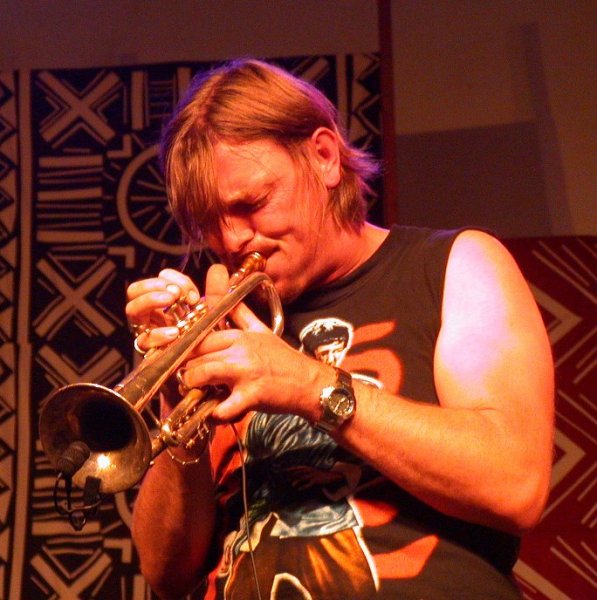 The one tune of less than high energy was a very strange Chet-Baker-on-Ecstasy rendition of "My Funny Valentine," with Lapp craning his neck to sing into his trumpet mic. For the final selection, the band pulled out all the stops and whipped the by-now overflowing audience into a frenzy, climaxing with Lapp playing both violin and trumpet simultaneously, a feat that must be seen to be believed. While I was still trying to retrieve my jaw from the ground, the MC came out and called for an encore, a rare thing at a festival on such a tight schedule. The band obliged, and Lapp overcame technical problems with one instrument by switching to another and using the mic instead of a direct feed, missing all his effects, but still performing admirably. The audience groaned in disappointment when it was announced that Lappelectro had no CDs to sell, and directed everyone to the band's website for news on future releases.
The one tune of less than high energy was a very strange Chet-Baker-on-Ecstasy rendition of "My Funny Valentine," with Lapp craning his neck to sing into his trumpet mic. For the final selection, the band pulled out all the stops and whipped the by-now overflowing audience into a frenzy, climaxing with Lapp playing both violin and trumpet simultaneously, a feat that must be seen to be believed. While I was still trying to retrieve my jaw from the ground, the MC came out and called for an encore, a rare thing at a festival on such a tight schedule. The band obliged, and Lapp overcame technical problems with one instrument by switching to another and using the mic instead of a direct feed, missing all his effects, but still performing admirably. The audience groaned in disappointment when it was announced that Lappelectro had no CDs to sell, and directed everyone to the band's website for news on future releases.
From new discoveries to old favorites...
I knew the next act on my itinerary would be a big draw, so I made my way to the next stage early, and caught the end of an interesting set by the Chemirani Zarb Trio, a father and two sons from Iran who play the ancient Persian zarb drums, which like tablas are capable of producing a wide range of sounds depending on how the heads are struck.
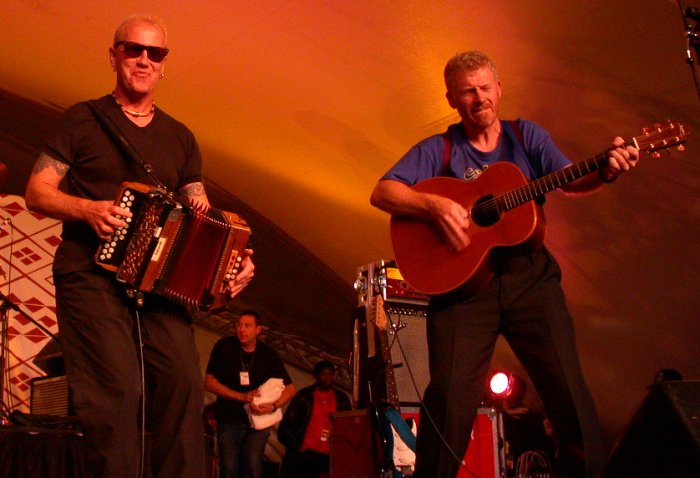 Hanging around for a while at that stage, I took the opportunity to lie back and close my eyes. That was the easiest way to save adequate room in the overflowing crowd who gathered to see England's Oysterband, purveyors of folk-inflected rock for more than 15 years. I've been a fan of theirs for nearly that entire time, and since it's been several years since the band's last Seattle appearance, I was looking forward to hearing material from their last few albums. Their set started with an acapella rendition of "Coal Not Dole" which segued smoothly into their pounding version of "Bells of Rhymney," both long-time staples in the band's repertoire.
Hanging around for a while at that stage, I took the opportunity to lie back and close my eyes. That was the easiest way to save adequate room in the overflowing crowd who gathered to see England's Oysterband, purveyors of folk-inflected rock for more than 15 years. I've been a fan of theirs for nearly that entire time, and since it's been several years since the band's last Seattle appearance, I was looking forward to hearing material from their last few albums. Their set started with an acapella rendition of "Coal Not Dole" which segued smoothly into their pounding version of "Bells of Rhymney," both long-time staples in the band's repertoire.
The rest of the set proved a mixed bag of old and new, politics and partying. The band's well-known working-class stance did not put off any of the locals so far as I can see – after all, this is the town that erupted when the WTO came to visit, a fact that singer John Jones congratulated us on. Many familiar tunes resulted in audience singalongs, among them "Love Vigilantes" and "Everywhere I Go" with its memorable lines: "Everywhere I go, I hear what's going on, and the more I hear, the less I know." The Oysterband stands as a true inheritor of the tradition of Fairport Convention, combining traditional songs, rock music of the current times, and select covers from contemporary artists.
Sunday
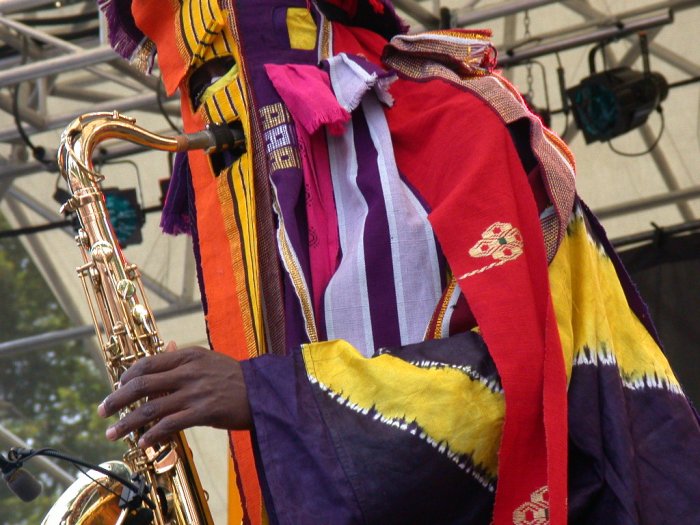 The weather on Sunday looked very promising, and held up well, turning downright warm by the late afternoon. Things were looking good for a larger crowd, and that's exactly what we got.
The weather on Sunday looked very promising, and held up well, turning downright warm by the late afternoon. Things were looking good for a larger crowd, and that's exactly what we got.
Starting the day on the main stage, Lágbájá played a set very similar to what they played on Saturday afternoon, with one amusing exception. At one point, Lágbájá told the audience he was going to remove his famous mask for them. He made an elaborate show of asking that all cameras and video recorders be put away, then untied the elaborate fasteners of his costume and pulled the mask over his head, revealing...another mask!
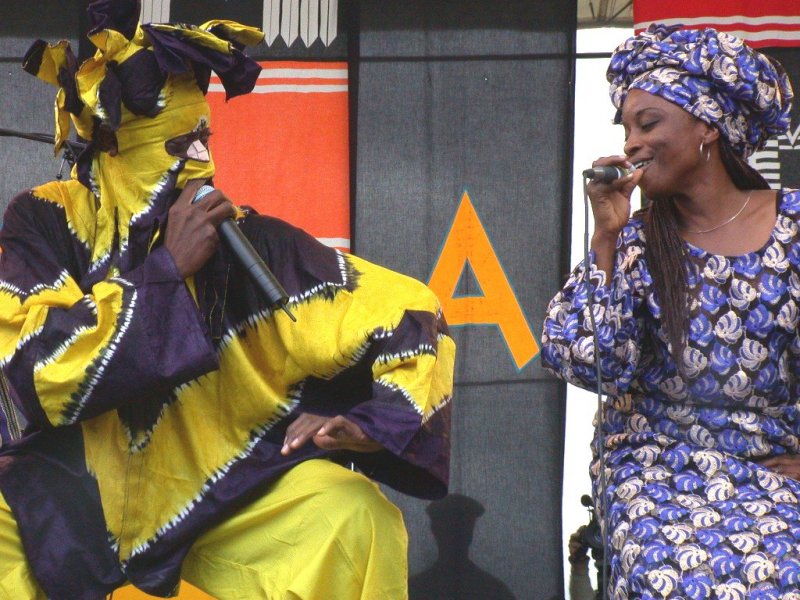 A particular favorite of the crowd was "The Simple Truth" – a plea that politicians should tell just that, and not hide their true meaning behind indirect statements, technicalities, and evasions (a tendency of American politicians that apparently extends to Africa and beyond as well). Audience sing along participation went over enthusiastically. An impressive, energetic set all around.
A particular favorite of the crowd was "The Simple Truth" – a plea that politicians should tell just that, and not hide their true meaning behind indirect statements, technicalities, and evasions (a tendency of American politicians that apparently extends to Africa and beyond as well). Audience sing along participation went over enthusiastically. An impressive, energetic set all around.
Still bouncing from all the percussive energy, I made my way to the stage where Sawt Al Atlas would play. They were billed as a rai group from Morocco. Since rai is mostly associated with Algeria, I thought this might prove interesting, and I was right. The band featured two charismatic lead singers, bass, drums, keyboards, violin, and a percussionist. The slinky, danceable rhythms were quite enjoyable, with a good balance between Arabic and pop sides.
After Sawt Al Atlas finished, it was back to the mainstage for the festival's final stretch. The African vocal ensemble Imbizo got things started with lush harmonies (along the lines of Ladysmith Black Mambazo) and dancing. As the sun went down, the nine singers held the stage for a relatively short set that served as prelude to the evening's main attraction. Good as they were, most people seemed to be mainly concerned with the immanent performance of Peter Gabriel. After Imbizo's departure, time seemed to drag on at an unbearably slow pace, until finally...
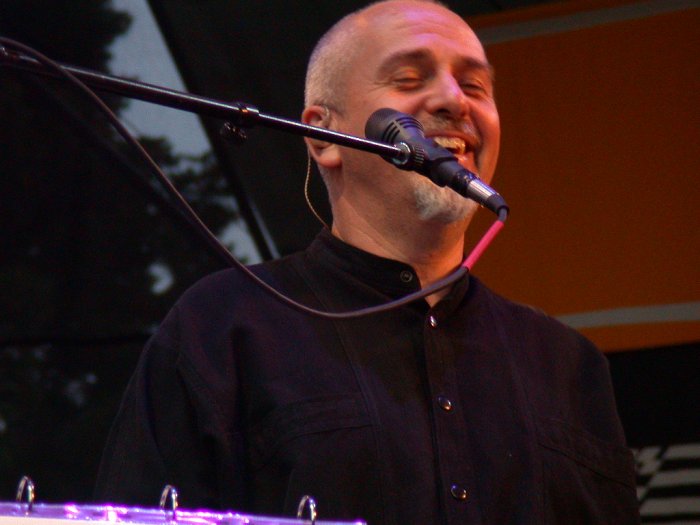 A local radio DJ took the stage and seemed a little overwhelmed at the magnitude of the occasion. For a large percentage of the thousands now present, Peter Gabriel has attained a stature completely out of proportion with his small number of big hit singles, and his live performances have become so rare, especially on this side of the Atlantic, that a kind of frenzy seemed to come over the festival grounds. I sneaked a peak over the barrier to look at the crowd, and it seemed to stretch for miles – thousands of people on their feet in anticipation. The DJ's introduction consisted of little more than, "You know what you're waiting for – here he is!"
A local radio DJ took the stage and seemed a little overwhelmed at the magnitude of the occasion. For a large percentage of the thousands now present, Peter Gabriel has attained a stature completely out of proportion with his small number of big hit singles, and his live performances have become so rare, especially on this side of the Atlantic, that a kind of frenzy seemed to come over the festival grounds. I sneaked a peak over the barrier to look at the crowd, and it seemed to stretch for miles – thousands of people on their feet in anticipation. The DJ's introduction consisted of little more than, "You know what you're waiting for – here he is!"
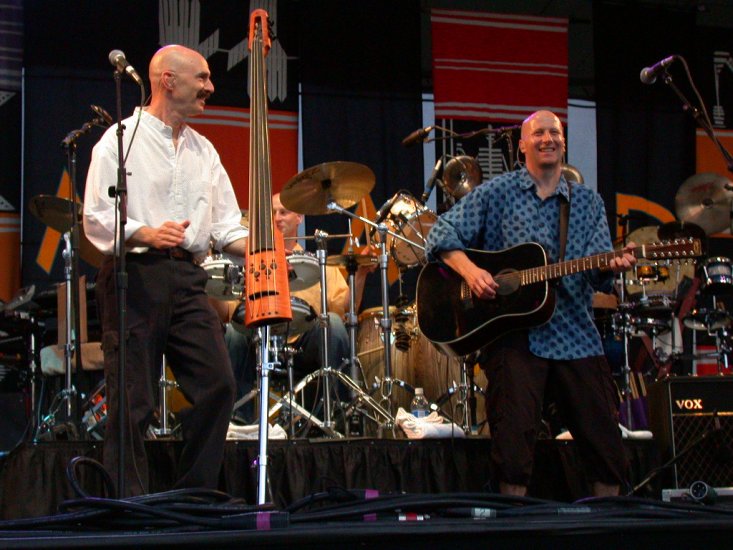 Peter Gabriel's performance had been billed as a short acoustic set, accompanied only by Tony Levin and David Rhodes, so we were quite surprised to see a full band take the stage. Levin was there with an electric upright bass, and Rhodes had an acoustic guitar, but there was also a drum set (manned by Ged Lynch), a keyboard rack for James McNally (of Afro Celt Sound System), and a backing vocalist who turned out to be Melanie Gabriel, Peter's daughter. In a wonderful gesture to his legions of fans, the set list was chosen by voting at his web site, and the choices show a refreshing disregard for the "hits." "Here Comes the Flood" started with Peter alone at a keyboard, and was followed by "Red Rain" and "Digging in the Dirt." Predictable enough so far, but the next choice, which Peter claimed received more votes than any other, was "Family Snapshot," a song he has not performed live very often.
Peter Gabriel's performance had been billed as a short acoustic set, accompanied only by Tony Levin and David Rhodes, so we were quite surprised to see a full band take the stage. Levin was there with an electric upright bass, and Rhodes had an acoustic guitar, but there was also a drum set (manned by Ged Lynch), a keyboard rack for James McNally (of Afro Celt Sound System), and a backing vocalist who turned out to be Melanie Gabriel, Peter's daughter. In a wonderful gesture to his legions of fans, the set list was chosen by voting at his web site, and the choices show a refreshing disregard for the "hits." "Here Comes the Flood" started with Peter alone at a keyboard, and was followed by "Red Rain" and "Digging in the Dirt." Predictable enough so far, but the next choice, which Peter claimed received more votes than any other, was "Family Snapshot," a song he has not performed live very often.
"Come Talk to Me" gained extra poignancy by Melanie's presence for those familiar with the song's genesis: it was written as a plea from a father who feels he does not spend enough time with his daughter. "Mercy Street," and "Solsbury Hill" followed, then a new song called "Signal to Noise" which Peter said he had originally done accompanied by Nusrat Fateh Ali Khan before his death (giving a hint about how long Peter's next album has been in the works). I wish I could give a detailed description of the song, but the whole show seemed to pass so quickly that it couldn't have been real. We'll have to wait for the album, I suppose.
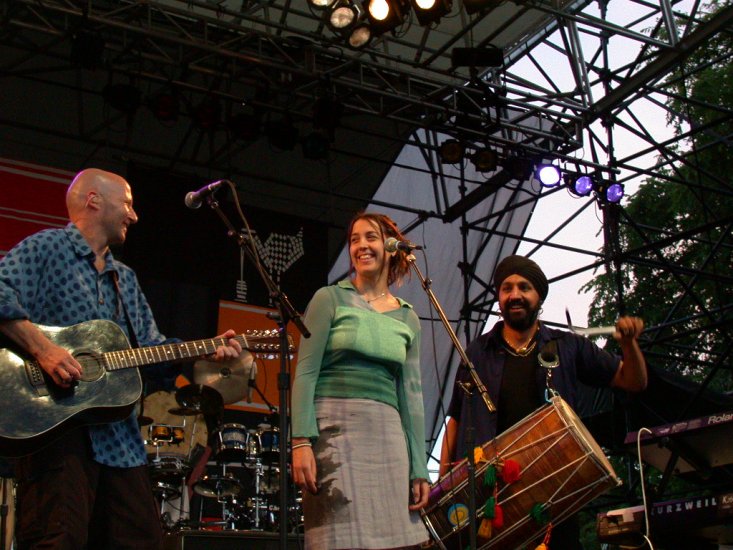 The Peter Gabriel portion of the show finished with "In Your Eyes" of course. All the members of Imbizo came out on stage, as did Moussa Sissokho and Johnny Kalsi of Afro Celt Sound System on percussion. The celebratory nature of the song was admirably served by the multitude on the stage, and even though from a purely musical standpoint the relative lack of rehearsal might have rendered it less than perfect, no one was complaining.
The Peter Gabriel portion of the show finished with "In Your Eyes" of course. All the members of Imbizo came out on stage, as did Moussa Sissokho and Johnny Kalsi of Afro Celt Sound System on percussion. The celebratory nature of the song was admirably served by the multitude on the stage, and even though from a purely musical standpoint the relative lack of rehearsal might have rendered it less than perfect, no one was complaining.
For a brief encore, Peter returned and sang the intimate "Father, Son" from the Ovo album, letting everyone down easy. We all knew he would be back later to sing with Afro Celt Sound System, but the weekend could have ended right then and left us quite satisfied.
The festival's headliner was Afro Celt Sound System, who had appeared at WOMAD 2000 to great acclaim. The presence of Peter Gabriel on their new album (Volume 3: Further in Time), along with a number of successful shows in the Seattle area over the last few years, made them a perfect choice for closer, and they did not disappoint. Their blend of Celtic, African, and contemporary electronic music neatly summarizes what WOMAD is all about. It was fully dark by the time they started, and they favor relatively dark lighting, so photographing them was difficult. But they sounded great, with excellent dynamics and showmanship balanced with musicianship.
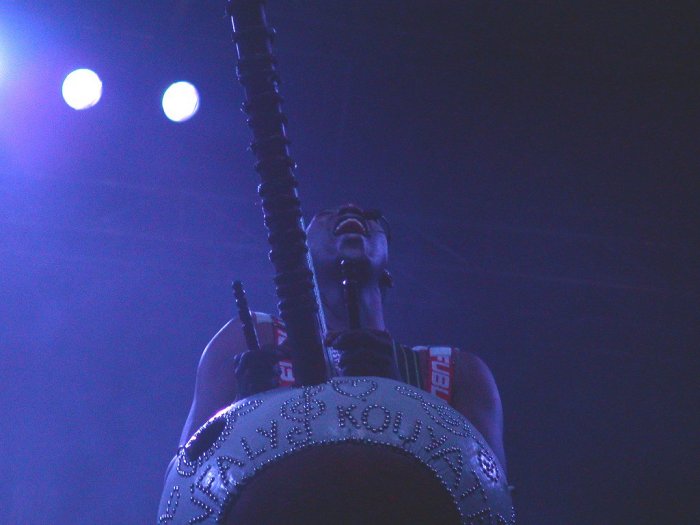 Tunes from all three of their albums mixed together seamlessly. Iarla O Lionaird's singing features more prominently than in the past, and he has started singing more upbeat tunes, as opposed to staying with the slower songs as he used to. N'Faly Kouyate provided many great moments playing kora and singing, as well as playing electronic percussion. Moussa Sissokho's talking drum is an integral part of many of the songs, adding both rhythm and sharp melodic fragments. Johnny Kalsi, with his big dhol drum, tablas, and other percussion, has become so much a part of the band that I'm afraid they'll need to change their name to Afro Indo Celt Sound System. Renowned British percussionist Pete Lockett joined the band with a giant rack of instruments that took up a significant portion of the stage.
Tunes from all three of their albums mixed together seamlessly. Iarla O Lionaird's singing features more prominently than in the past, and he has started singing more upbeat tunes, as opposed to staying with the slower songs as he used to. N'Faly Kouyate provided many great moments playing kora and singing, as well as playing electronic percussion. Moussa Sissokho's talking drum is an integral part of many of the songs, adding both rhythm and sharp melodic fragments. Johnny Kalsi, with his big dhol drum, tablas, and other percussion, has become so much a part of the band that I'm afraid they'll need to change their name to Afro Indo Celt Sound System. Renowned British percussionist Pete Lockett joined the band with a giant rack of instruments that took up a significant portion of the stage.
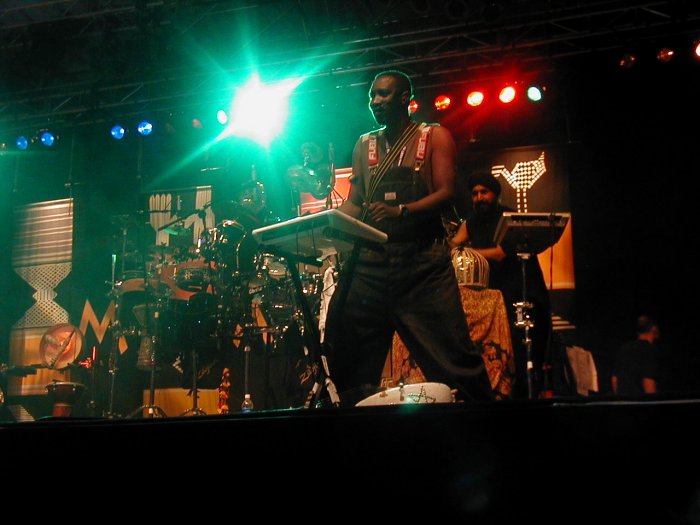 I've seen a number of bands try to integrate electronic programming with live performance, and the mixture often comes off rather awkward, and the absence of the drummer is sorely felt. But the Afro Celts, with so much live percussion, handle the dichotomy flawlessly. There is often so much pounding on stage that the fact that other noises can be heard is secondary. Sissokho and Kalsi's drum battles never fail to stir the crowd, and Lockett adds another aspect, with all three of them roaming wirelessly around. James McNally and Simon Emmerson both have large racks of equipment but spend much of their time away from it, McNally playing various flutes and whistles and bodhran, Emmerson with acoustic guitar.
I've seen a number of bands try to integrate electronic programming with live performance, and the mixture often comes off rather awkward, and the absence of the drummer is sorely felt. But the Afro Celts, with so much live percussion, handle the dichotomy flawlessly. There is often so much pounding on stage that the fact that other noises can be heard is secondary. Sissokho and Kalsi's drum battles never fail to stir the crowd, and Lockett adds another aspect, with all three of them roaming wirelessly around. James McNally and Simon Emmerson both have large racks of equipment but spend much of their time away from it, McNally playing various flutes and whistles and bodhran, Emmerson with acoustic guitar.
As great as the Afro Celts were, a sense of anticipation permeated the grounds. We all knew where the show was headed.
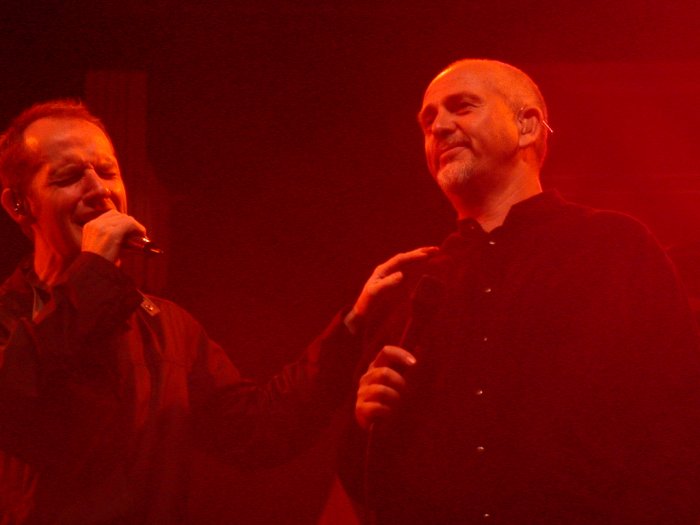 Peter Gabriel returned to the stage for the single off Further in Time, "When You're Falling," to finish off the festival in grand fashion. In past years, WOMAD has ended with a Grande Jam, where members of many of the participating groups all get on stage together. While those jams have produced numerous memorable moments, this collaborative tune featuring the group who most encapsulates what WOMAD is all about, plus the singer who helped bring the festival into being, seemed an even more fitting finale. All too soon, it was over, and thousands of people cheered wildly for an encore that was not to be. I, for one, did not mind. Anything else would have been anticlimactic; we had the perfect punctuation at the end of the sentence, and there was no need to clutter it up with a few more words.
Peter Gabriel returned to the stage for the single off Further in Time, "When You're Falling," to finish off the festival in grand fashion. In past years, WOMAD has ended with a Grande Jam, where members of many of the participating groups all get on stage together. While those jams have produced numerous memorable moments, this collaborative tune featuring the group who most encapsulates what WOMAD is all about, plus the singer who helped bring the festival into being, seemed an even more fitting finale. All too soon, it was over, and thousands of people cheered wildly for an encore that was not to be. I, for one, did not mind. Anything else would have been anticlimactic; we had the perfect punctuation at the end of the sentence, and there was no need to clutter it up with a few more words.
As with many endeavors of such massive proportions, there is some uncertainty about the future of WOMAD at Marymoor Park. Funding is crucial, and without some corporate sponsors coming on board, things will be tough next year. All parties involved have sworn to continue the precedent, and we can only hope they succeed.
As of 2015, there has not been another WOMAD festival in the Seattle area. — Ed.
Filed under: Festivals, Issue 23
Related artist(s): Tony Levin, Peter Gabriel, Oysterband, Afro Celt Sound System, Daniel Lapp, Youssou N'Dour, David Rhodes
What's new
These are the most recent changes made to artists, releases, and articles.
- Review: Sterbus - Black and Gold
Published 2026-03-03 - Release: Janel Leppin's Ensemble Volcanic Ash - Pluto in Aquarius
Updated 2026-03-02 15:06:51 - Release: Janel Leppin - Slowly Melting
Updated 2026-03-02 15:05:27 - Release: Alister Spence - Always Ever
Updated 2026-03-02 15:04:11 - Release: Let Spin - I Am Alien
Updated 2026-03-02 15:02:41 - Review: Falter Bramnk - Vinyland Odyssee
Published 2026-03-02 - Review: Exit - Dove Va la Tua Strada?
Published 2026-03-01 - Review: Steve Tibbetts - Close
Published 2026-02-28 - Release: We Stood Like Kings - Pinocchio
Updated 2026-02-27 19:24:02 - Release: Stephen Grew - Pianoply
Updated 2026-02-27 19:20:11 - Release: Thierry Zaboitzeff - Artefacts
Updated 2026-02-27 00:16:46 - Review: Kevin Kastning - Codex I & Codex II
Published 2026-02-27 - Release: Zan Zone - The Rock Is Still Rollin'
Updated 2026-02-26 23:26:09 - Release: The Leemoo Gang - A Family Business
Updated 2026-02-26 23:07:29 - Release: Ciolkowska - Bomba Nastoyashchego
Updated 2026-02-26 13:08:55 - Review: Immensity Crumb - Chamber Music for Sleeping Giants
Published 2026-02-26 - Release: The Gatekeepers - Diary of a Teenage Prophet
Updated 2026-02-25 15:55:58 - Review: Mars Lasar - Grand Canyon
Published 2026-02-25 - Listen and discover: Mordecai Smyth will not break your back
Published 2026-02-25
